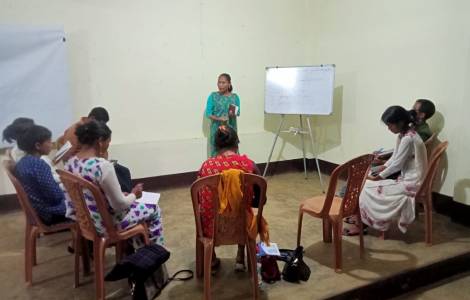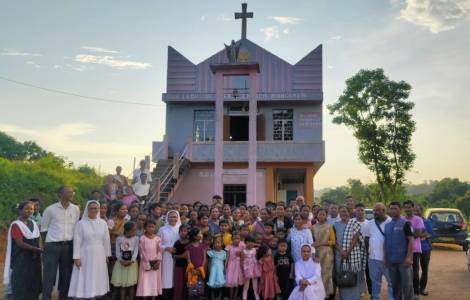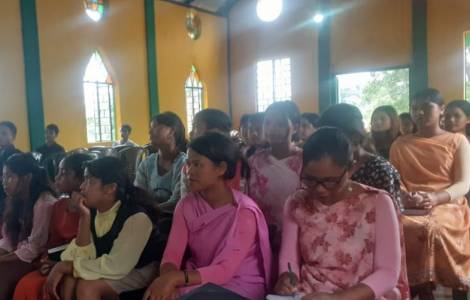
Diocese of Nongstoin
Nongstoin (Agenzia Fides) - "In our territory, where women are at the center of family and social life, the Church also has a feminine face. And devotion to the Virgin Mary is strong and deep-rooted," says to Fides Wilbert Marwein, Bishop of Nongstoin, a diocese in the Indian state of Meghalaya, one of the seven states in north-east India. It is one of the three states (Meghalaya, Mizoram and Nagaland, all located in the same territory) where the Christian population is the majority in the Indian Federation. In the state of Meghalaya there are almost a million Catholic believers (out of a population of 3.3 million), but Christians of various denominations (with Baptists, Presbyterians, Anglicans) make up a total of 75% of the population.
"We received the faith from the Italian and Spanish Salesian missionaries and we are grateful for that," says the Bishop. "Our diocese extends over a mountainous area where it is very difficult to reach the remote villages, inhabited mainly by communities of the three main tribal groups: Khasi, Garo and Jaintia. Despite the geographical difficulties, the mission of the Church is progressing very well and the love of Christ continues to attract new believers. In 2006, when the diocese was carved out of the Shillong territory, we counted 120,000 Catholics; today there are 175,000."
"Every year," continues the bishop, "we have the gift of many new baptisms of children and adults, and we register conversions of animist locals. This happens above all thanks to the testimony of priests, nuns and catechists who build friendly relations with the people and help those in need. Often, those who ask for baptism say that they are impressed by the Eucharist, by Jesus who became bread for us, or by the intense prayer in community.”
In Meghalaya, the culture of all three major ethnic groups has a particularity: it is a matriarchal society in which the woman carries the family forward and is the main point of reference. Children take their mother's surname and “there is a great celebration in the family when a girl is born,” says the bishop. “Moreover, it is the last daughter who - according to the ancient social and cultural tradition - inherits the entire family assets,” he reports.
In this cultural context, women also play a special role in the ecclesial community: “There are many catechists, women who lead remote communities, who are present in the pastoral councils and organize pastoral life in the parishes. Our Church definitely has a female face and there is no ‘competition’ with the work and commitment of priests.”
The presence and importance of women is also demonstrated by the number and work of women's religious orders, "in which thousands of consecrated women carry out an apostolic service to the poorest population with great devotion, often in the schools attached to the parishes, and which are very appreciated by the population," continued Bishop Marwein.
And it is precisely because of these cultural realities that "the spiritual relationship with the figure of the Virgin Mary is something very precious and easily accessible for the local population, even for the simple and uneducated." "We experience a deep Marian devotion. The figure of Mary is very loved, there are processions with deep devotion, she is the mediator who leads the faith of her children to Christ, as we see in so many who are converted 'through Mary': Ad Jesum per Mariam (Through Mary to Jesus), as Saint Louis Grignion de Monfort used to say. Now in October, the special month of the Rosary, the Rosary is prayed at home in every Catholic family in the diocese. Mary is truly our Mother, the faithful feel like her children, loved and protected by her,” affirms the bishop.
The Bishop of Nongstoin often travels to remote villages where he feels the faith of the people: “I enjoy visiting villages and am really edified by it. There are simple and humble people there. They want to talk and wait for the Sacraments. When I come to a village, I often spend more than three hours administering the sacrament of confession. A single parish (we have 22 in the diocese, 16 of which are outside the town of Nongstoin, scattered in the inaccessible area) often includes more than 30-40 villages, with small groups of Catholic families who are moved when a catechist, priest or bishop arrives. This is my mission, and often on this path I meet people who do not know the Lord Jesus: this is how we try to spread the love of God to proclaim and testify to the Gospel that can touch the heart of every man and woman." (PA) (Agenzia Fides, 8/10/2024)

Diocese of Nongstoin

Diocese of Nongstoin